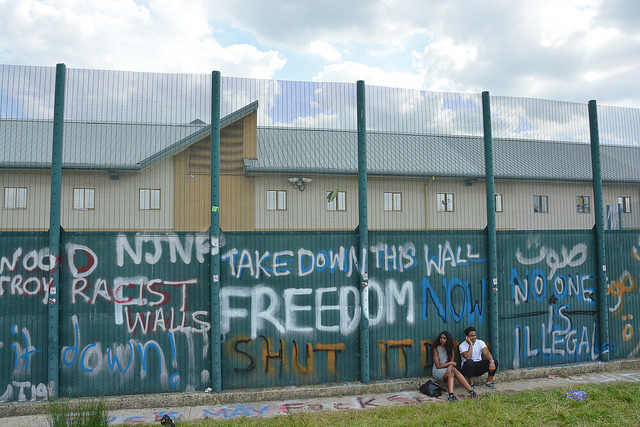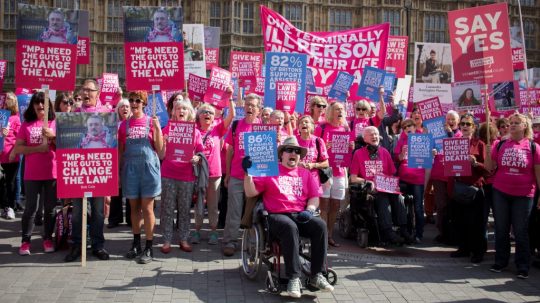The family of a man who died after taking an overdose of painkillers at an immigration removal centre is calling for an end to the indefinite detention of migrants and asylum seekers.
Amir Siman-Tov died in Colnbrook Immigration Removal Centre, near Heathrow, on 17 February 2016 after consuming a handful of prescription pills he had hoarded in the days before.
The 41-year-old, a Jewish convert from Morocco, lived in north east London with his family after being granted asylum in 2001.
But he became liable for deportation after serving a prison sentence. He was detained by the Home Office on 25 January 2016 after failing to attend a meeting as part of the conditions of his immigration bail.
Amir’s family released a statement following a three-week inquest into his death which concluded last week, after being repeatedly delayed.
“Amir was loved by his family and his death has been devastating for us,” they said.
They spoke of their shock to learn that some of the changes identified as necessary to prevent further deaths have, three years on, not been implemented by the Central and North West London NHS Trust and private contractors Mitie.
They added: “We also call on the Home Office to end its inhumane policy of indefinite immigration detention which, as Amir’s case shows, ruins lives and has no place in a civilised society.”
‘Inadequate Information Sharing’

Image credit: Pixabay
West London Coroner’s Court jurors found that Amir died as a result of “misadventure”. This term means that the deceased took a deliberate action which then resulted in death.
He had a history of mental ill health and attempted to hang himself in January 2016 while in a holding room, according to a report from the Prisons and Probation Ombudsman.
Three days later, he was transferred to Colnbrook detention centre and placed under constant supervision in accordance with special self-harm and suicide monitoring procedures.
He told a consultant psychiatrist that “he would rather die than be deported back to Morocco,” the report adds.
On 16 February, an officer witnessed Mr Siman-Tov take a handful of prescription codeine tablets and ibuprofen.
He was taken to Hillingdon Hospital where a doctor discharged him after receiving a phone call from a psychiatrist at Colnbrook who was sceptical Amir had taken an overdose, suggesting he may have taken “tic tacs”.
Amir vomited repeatedly as custody officers returned him to Colnbrook, but the officers told the nurse he only vomited once.
The nurse explained that if he had known that Amir had vomited repeatedly, this would have been a “red flag” and he would have arranged for him to be returned to hospital.
Custody officers found him unresponsive at 3.15am and he was pronounced dead by paramedics at 4.10am.
The jury ruled that “inadequate information sharing” resulted in several missed opportunities to prevent the hoarding and ingestion of prescribed medication “despite Mr Siman-Tov repeatedly stating his intention to do so”, and that this contributed to his death.
‘An Unprecedented Number Of People Are Dying In Immigration Detention Centres’

Protestors calling for the closure of Yarl’s Wood Immigration Detention Centre. Image Credit: IDarrenJ / Flickr.
In 2018, around 24,700 migrants and asylum seekers were placed into detention centres with no time limit on how long they can be held.
Natasha Thompson, a caseworker with charity Inquest, said: “An unprecedented number of people are dying in immigration detention centres.
“Successive inquests have highlighted fundamental failings in treatment and care as well as unsafe systems and practices.”
In April 2017, 43-year-old Branko Zdravkovic took his own life 19 days after entering the The Verne Immigration Removal Centre, in Dorset.
Michal Netyks, 35, committed suicide while serving a short sentence at the G4S-run Liverpool prison, making him the 11th to die in a detention centre in 2017.
Successive inquests have highlighted fundamental failings in treatment and care as well as unsafe systems and practices
Natasha Thompson, Caseworker at Inquest
Mia Hasenson-Gross, executive director of Jewish human rights group René Cassin, added: “Granting refuge to those who seek shelter is a core value within the Jewish tradition and one that the community remains committed to.
“On this basis, René Cassin has long campaigned for the introduction of a 28-day time limit on detention. It is now time for the Government to listen.”
What Did The Government Say?
A Home Office spokeswoman told RightsInfo: “Any death in detention is a tragic event and our thoughts and condolences are with the family and friends of Mr Siman-Tov.
“The welfare of all those in our care is of the utmost importance and we are grateful to the Prisons and Probation Ombudsman for his report.
“Recommendations made following any investigation into a death are treated seriously and action is taken to ensure they are implemented swiftly.”







